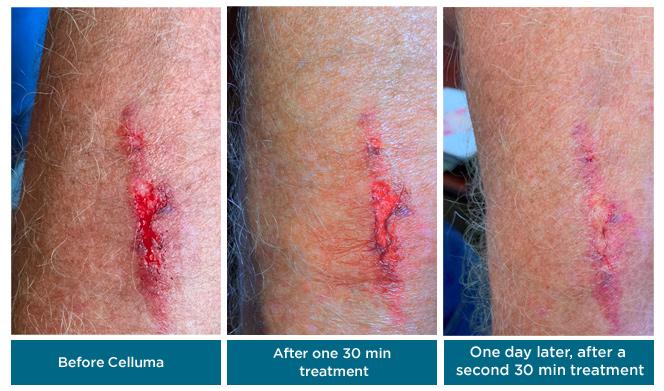—Journal of Biomedical Optics
LED Light Therapy Wound Healing
Accelerate Wound Healing At the Speed of Light *
My patients have enjoyed significant reduction in inflammation and bruising as a result of using the Celluma” -Dr. Jesse, M.D.
LED Light Therapy for Wound Healing
Celluma Light Therapy for the Treatment of Dermal Wounds
In original research conducted at the prestigious Beckman LASER Institute at the University of California, Celluma was clinically proven to speed the rate of wound closure equaling or outperforming cold LASERs of similar optical parameters4.
The Celluma is medically CE- Marked in Europe for all FDA indications-for-use as well as for Dermal Wound Healing as a Class 11A medical device in the European Union. Ideal for use following surgery to enhance healing of incisions or non-healing wounds, Celluma LED therapy can help reduce patient down-time and fight infection while increasing overall patient satisfaction.
Light therapy has been shown to accelerate tissue repair, decrease wound size and accelerate wound closure as well as other beneficial effects. These mechanisms have been demonstrated to promote dermal wound healing as well as reduce the pain associated with the healing process. The Celluma is intended to be used for dermal wound healing referring to the treatment of surface wounds existing at the outer 2mm of the skin and including normal, acute post-surgical and chronic wound healing including but not limited to diabetic ulcers
The seminal research for Low Level Light Therapy (LLLT), also known as LED therapy, was conducted by NASA’s Marshall Space Flight Center out of concern for astronauts who might be injured or become ill during long term space flight. In response to this health risk, NASA developed LED (light emitting diode) technology that showed great promise for delivering light energy deep into the body to promote wound healing and human tissue growth. The therapeutic benefits of LLLT has been demonstrated in thousands of clinical studies, articles and peer reviewed literature to show that the mechanism for action is cellular absorption of photons (light energy) and the increased production of adenosine triphosphate (ATP), the form of energy which cells utilize to fuel cellular activity. The resulting ATP is then used to power metabolic processes, which includes synthesizing DNA, RNA, and the proteins and enzymes needed to repair or regenerate cells.

Low level-light therapy has been shown decrease a patient’s recovery time while reducing discomfort levels and enhancing overall outcomes. It is ideally suited following any ablative procedure as well as pre and post-surgery for the following reasons:
- Phototherapy has been shown to accelerate tissue repair, decrease wound size, accelerate the resolution of erythema, accelerate wound closure and prevent dehiscence¹.
- Phototherapy prior to surgery may reduce the incidence of hypertrophic scars and keloids ².
- Ongoing post-surgery photo-rejunvenation² (activation of fibroblasts to produce collagen and elastin, stimulation of keratinocytes which produce keratin to provide structural strength to the skin).
- Post inflammatory hyperpigmentation prevention².
- Activation of mast, macrophage and neutrophil cells can decrease inflammation and protect against infection.
- Phototherapy is anti-bacterial. The presence of P-acne bacteria can lead to post-operative infections, particularly in shoulder surgery. Using the professional grade LED light therapy prior to surgery can decrease the presence of this bacteria

Wound Healing Studies
There are hundreds of studies detailing the benefits of LED light therapy and its positive impact on wound healing including burns, surgical incisions, and diabetic ulcers. Below is an excerpt and abstract from Photobiomodulation Therapy for Wound Care: A Potent, Noninvasive, Photoceutical Approach³. Adv Skin Wound Care. (2019) on the subject of light therapy for wound healing.
General purpose: To provide background and examine evidence for the therapeutic application of light energy treatments for wound healing.
Target audience: This continuing education activity is intended for physicians, physician assistants, nurse practitioners, and nurses with an interest in skin and wound care
Abstract: To provide background and examine evidence for the therapeutic applications of light energy treatments for wound healing. A search was performed in PubMed for peer-reviewed scientific articles published in the last 5 years using the search terms “photobiomodulation therapy” and “low-level laser therapy,” and these terms combined with “wound,” using a “human species” filter. This search yielded 218 articles on photobiomodulation therapy or low-level laser therapy and wounds. Of these, only articles on in vivo wound care using light treatments were specifically included in this review (n = 11).The wound healing effects of low-dose laser treatments were first described over 50 years ago. Various doses ranging from 0.1 to 10 J/cm and wavelengths ranging from 405 to 1,000 nm appear to provide therapeutic benefits for a broad range of chronic wounds. A range of light energy sources from LEDs to lasers have been used and have specific advantages and limitations. There is a lack of consensus on standardized treatment parameters such as wavelengths, dose, and therapeutic outcomes in the reviewed studies, preventing direct comparison and clinical protocol recommendation. An expert opinion based on ongoing research studies and reported literature is offered. Noninvasive, economical, and multipurpose light devices are an attractive tool for wound management. However, there is an urgent need in the wound care community to develop optimal clinical protocols for use based on well-designed, rigorous clinical research studies.
In a 2014 study conducted at the University of California’s Beckman LASER Institute, Comparison of laser and diode sources for acceleration of in vitro wound healing by low-level light therapy4, Celluma compared favorably a low level LASER when used to accelerate for wound closure. Here is the Abstract:
Abstract. Low-level light therapy has been shown to improve in vitro wound healing. However, well-defined parameters of different light sources for this therapy are lacking. The goal of this study was (1) to determine if the wavelengths tested are effective for in vitro wound healing and (2) to compare a laser and a light-emitting diode (LED) source at similar wavelengths. We show four wavelengths, delivered by either a laser or LED array, improved in vitro wound healing in A549, U2OS, and PtK2 cells. Improved wound healing occurred through increased cell migration demonstrated through scratch wound and transwell assays. Cell proliferation was tested by the (3-(4,5-dimethylthiazol-2-yl)-5-(3-car-boxymethoxyphenyl)-2-(4-sulfophenyl)-2H-tetrazolium) (MTS) assay and was found generally not to be involved in the wound healing process. The laser and LED sources were found to be comparable when equal doses of light were applied. The biological response measured was similar in most cases. We conclude that the laser at 652 (5.57 mW∕cm2, 10.02 J∕cm2) and 806 nm (1.30 mW∕cm2, 2.334 J∕cm2) (full bandwidth 5 nm), and LED at 637 (5.57 mW∕cm2, 10.02 J∕cm2) and 901 nm (1.30 mW∕cm2, 2.334 J∕cm2) (full bandwidth 17 and 69 nm respectively) induce comparable levels of cell migration and wound closure.
The Future of Light Therapy
Light therapy has been shown to be extremely beneficial and will continue to play a huge role in the future of medicine for treating many conditions, including wound healing.
We invite you to read a few of the studies published to get a preview for what’s to come.
The day may not be far off when most homes will have a light source (most likely a LED device) to be used for aches, pains, cuts, bruises, joints, and which can also be applied to the hair and even transcranially to the brain.1
REFERENCE: 1 Hasmi JT, Huang YY, Osmani BZ, et al. Role of Low-Level Laser Therapy in Neurorehabilitation. PM&R. Dec. 2010;2(12):S292-S305.
Clinical Publications
Comparison of laser and diode sources for acceleration of in vitro wound healing by low-level light therapy
Combination of low-level light therapy and nitrosyl-cobinamide accelerates wound healing
—Journal of Biomedical Optics
References:
1. The effects of LED emissions on sternotomy incision repair after myocardial revascularization: a randomized double-blind study with follow-up Rauirys Alencar de Oliveira & Gilderlene Alves Fernandes & Andréa Conceição Gomes Lima & Antônio Dib Tajra Filho & Raimundo de Barros Araújo Jr. & Renata Amadei Nicolau Received: 2 August 2013 /Accepted: 25 November 2013 Springer-Verlag London 2013
2. Light-Emitting Diodes (LEDs) in Dermatology. D. Barolet, M.D. 2008.
3. Mosca RC, Ong AA, Albasha O, Bass K, Arany P. Photobiomodulation Therapy for Wound Care: A Potent, Noninvasive, Photoceutical Approach. Adv Skin Wound Care. 2019;32(4):157‐167. doi:10.1097/01.ASW.0000553600.97572.d2
4. Ryan Spitler a,* and Michael W. Berns a,b Comparison of laser and diode sources for acceleration of in vitro wound healing by low-level light therapy aUniversity of California Irvine, Beckman Laser Institute, Department of Developmental & Cell Biology, 1002 Health Sciences Road, Irvine, California 92612 bUniversity of California San Diego, La Jolla, California 92093. Journal of Biomedical Optics 19(3), 038001 (March 2014)
*Celluma is not FDA-cleared for wound healing. Celluma is medically CE-marked for wound healing acceleration after LASER ablative resurfacing of facial skin.